| Apion nigritarse | |
|---|---|
 | |
| Scientific classification | |
| Kingdom: | |
| Phylum: | |
| Class: | |
| Order: | |
| Suborder: | |
| Family: | |
| Genus: | |
| Species: | A. nigritarse |
| Binomial name | |
| Apion nigritarse Kirby, 1808 | |
Apion nigritarse is a species of seed weevils native to Europe. [1] [2]
| Apion nigritarse | |
|---|---|
 | |
| Scientific classification | |
| Kingdom: | |
| Phylum: | |
| Class: | |
| Order: | |
| Suborder: | |
| Family: | |
| Genus: | |
| Species: | A. nigritarse |
| Binomial name | |
| Apion nigritarse Kirby, 1808 | |
Apion nigritarse is a species of seed weevils native to Europe. [1] [2]

The Curculionidae are the family of the "true" weevils. They are one of the largest animal families, with 6,800 genera and 83,000 species described worldwide.

The boll weevil is a beetle that feeds on cotton buds and flowers. Thought to be native to Central Mexico, it migrated into the United States from Mexico in the late 19th century and had infested all U.S. cotton-growing areas by the 1920s, devastating the industry and the people working in the American South. During the late 20th century, it became a serious pest in South America as well. Since 1978, the Boll Weevil Eradication Program in the U.S. allowed full-scale cultivation to resume in many regions.
Zyzzyva is a genus of tropical American weevils often found in association with palms. It is a snouted beetle. "Zyzzyva" is the last word in many English-language dictionaries.
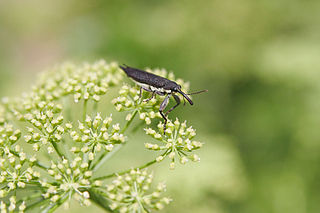
Weevils are beetles belonging to the superfamily Curculionoidea, known for their elongated snouts. They are usually small, less than 6 mm in length, and herbivorous. About 97,000 species of weevils are known. They belong to several families, with most of them in the family Curculionidae. Some other beetles, although not closely related, bear the name "weevil", such as the biscuit weevil, which belongs to the family Ptinidae.

George of the Jungle is an American animated television series produced by Jay Ward and Bill Scott, who created The Rocky and Bullwinkle Show. The character George was inspired by the story of Tarzan and a cartoon characterization of George Eiferman drawn by a cook on his mine sweeper in the Navy during World War II. It ran for 17 episodes on Saturday mornings from September 9 to December 30, 1967, on the American television network ABC.
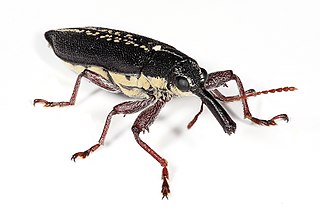
Belidae is a family of weevils, called belids or primitive weevils because they have straight antennae, unlike the "true weevils" or Curculionidae which have elbowed antennae. They are sometimes known as "cycad weevils", but this properly refers to a few species from the genera Parallocorynus and Rhopalotria.
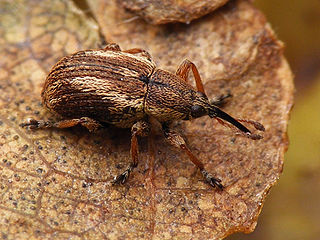
Exapion fuscirostre is a species of straight-snouted weevil known by the general common name Scotch broom seed weevil. It is used as an agent of biological pest control against the noxious weed known as Scotch broom.

Exapion ulicis is a species of straight-snouted weevil known by the general common name Gorse Seed Weevil. It is used as an agent of biological pest control against Common Gorse, which is classified as a noxious weed in some countries.

Exapion is a genus of straight-snouted weevils.
Mattesia is a genus of parasitic alveolates of the phylum Apicomplexa. Species in this genus infect insects.
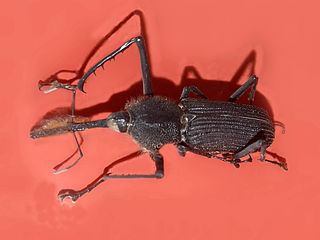
Rhinostomus barbirostris, common name Bottlebrush Weevil or Bearded Weevil, is a species of true weevil family.
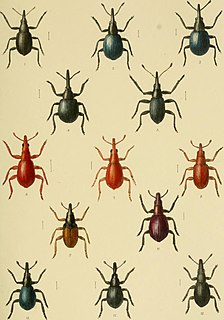
Apion ervi is a species of seed weevils native to Europe.

Apion rubens is a species of seed weevils native to Europe.
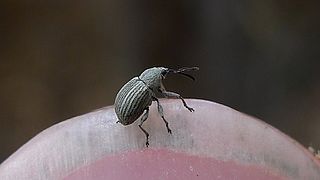
Apion ulicis is a species of seed weevils native to Europe.
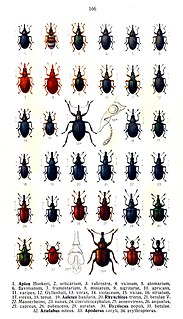
Apion rufirostre is a species of seed weevils native to Europe.

Apion violaceum is a species of seed weevils native to Europe.

Apion vorax is a species of seed weevils native to Europe.

Apion virens is a species of seed weevils native to Europe.

Apion viciae is a species of seed weevils native to Europe.

Apion pisi is a species of seed weevils native to Europe. It is phytophagous and a pest of lucerne
| This weevil-related article is a stub. You can help Wikipedia by expanding it. |